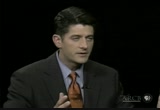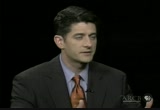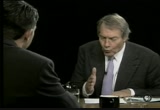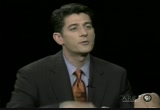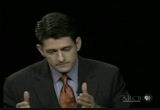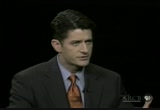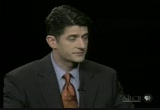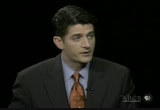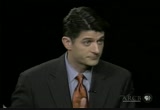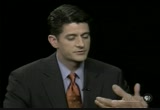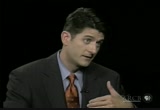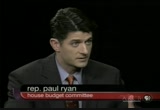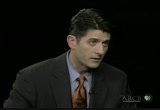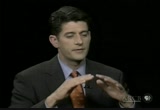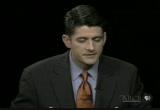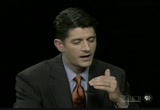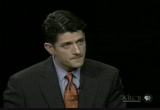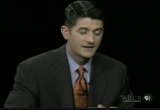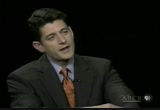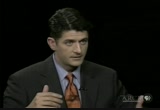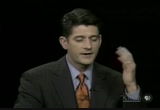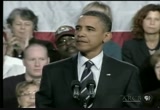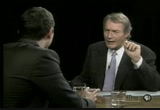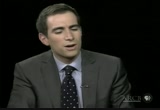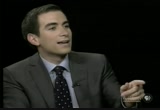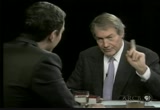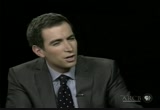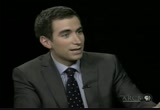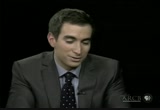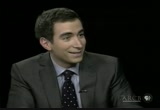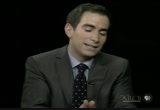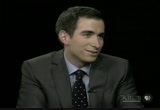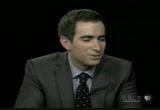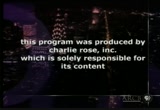tv Charlie Rose PBS September 13, 2010 10:00pm-11:00pm PST
11:00 pm
>> we're really talking approximating about what is this country going to be in the 21st century. who are we, what do we stand for, where are we going to be going forward. in the next few years partly because of this tipping point of pore and more people living off the government and for themselves, and the fiscal crisis coming due, that is going to determine what kind of country we're going to be. an that's why i say it really is sort of the traditional a american ideal model, a reliable sturdy safety net that we need to repair and save from going into bankruptcy with an opportunity society on top of it, or more of the sort of social democracy, welfare state that you see often. >> rose: and "new york times" column nissan drew ross sorkin and president obama, and wall street. >> had we not had the bailouts, think we would have been in a much worse place than we are today. we look around and go 10% unemployment in this country, that's awful. and that is true. but on a relative basis to where we could have been and
11:01 pm
you've heard hank paulson and others say at the time, thathey ough that we were headed towards 25% unemployment in this country, had the bailouts not been pursued. so i actually look at where we are today, warren buffett came out just today and said, you know, there won't be a double dip recession. i think there is a sense we might have some stable. i don't want to tell you is going to go on forever. but that's actually a pretty good outcome on a relative basis. >> rose: ryan and sorkin when we continue. >> funding for charlie rose was provided by the following: .
11:02 pm
11:03 pm
commission that will pro pote ways to address the swelling public debt. his bill road map for america's future proposes to cut the federal debt by partly dismantling social security and medicare. the proposal has received a lot of attention for its austerity and political boldness. i am pleased to have paul ryan here at this table for a conversation about his ideas which have created at least two kinds of responses. number one, the democrats say at least somebody is proposing something. that makes them at least willing to engage. and secondly, because some people say you know, how dare someone in political life start talking about dealing with medicare and social security. don't they know it's a third rail of american politics. am i right? >> you are right about that. >> rose: they say that. >> yeah. thanks for having me. >> rose: it is a pleasure to have you here. just tell me about the creation of this road map and what you think, why you felt like you had to do it and what is in it and why
11:04 pm
you think it works. >> okay, so number one, the reason i put this out there, starting in the bush administration in 2008 was to try and break this political paralysis we have. where we are walking off a fiscal cliff in this country. we have a debt that is exploding. we will have our own debt crisis and this social safety net going to be shredding itself because it is going insolvent. when i became the head of the budget committee for republicans i just saw it as my responsibility to seeing the situation to come up with a fix. and the reason i did this, basically i wanted to do three things. fulfill the mission of health and retirement security. i hardly would call this dismantling. pay off the national debt. and put our economy in a position to be thriving and prosperous and internationally very competitive in the 21st century economy. what i wanted to do was put a plan out there, not to simply say that i have got all of the answers and here is the only way to do it. i wanted to do it to encourage others to come up with their plan to get to an adult level of conversation on this so that more people would bring their plans to the table so we start talking about how to fix
11:05 pm
this mob problem, not if we next the problem. basically what happens in politics and in congress is if you propose something that's bold, that touches these third rails, the other side will use it as a political weapon against you so don't dare try. we have to get off, if we court start tackling the fiscal problem, it will tack ale lot. what i do the point i'm trying to make is we do this now and get our prosperity agenda. what i mean when i say this is my plan says nothing changes for anybody 35 and above. -- 55 and above, so if you are 10 years away from retiring we can guarantee your benefit, if you are 54 and below you know the programs won't be the samement you know that the social insurance safety net system we have is imploding. we need to reform it to fix it. i use a few values and principals on how i fix those things am i go kif-- i can give you details if you like. the point i make is do it now, preema debt crisis, if he kick the can down the road it will be austerity to
11:06 pm
everybody. tax increases to current workers that is the pain plan we shouldavoid that. >> rose: i meant by dismantle, just dismantle in the traditional way that it works. in other words, you can use the word change. >> words matter because it is such a volatile situation. >> rose: and because they would be used against you within with. >> that's right. >> rose: anybody, you say this is a man who wants to dispant el social security you have a fight right there. >> yeah. >> rose: let me approach this this way. the notion of what is the urgent problem, most people say the urgent problem is unemployment. the problem that is constant and with this is the deficit. but we've got to deal with unemployment first. that raises questions about doing things that will add to the deficit. >> these are not mutually exclusive goals. i would actually argue that one of the best things to do for the economy now is you show that we're getting the debt situation fixed later on. that will help us in realtime. that will help us unlock uncertainty in the economy. it will help us take pressure off our currency,
11:07 pm
help us stabilize interest rates it will help us show the markets that our tax rates aren't going to rise to unbelievable levels because we are getting our fiscal house in order. so if we locked in a plan to actually g our debt under control, that will actually help our economy right now because it will improve competence in the future of our economy. >> okay but are you prepared to spend money for stimulus in order to do something about unemployment. >> so i don't subscribe to the typical keynesian doctrine that you need to borrow and spend money to create jobsment we borrowed and spend 1.1 trillion when you add interest costs on the stimulus and we lost 2.6 million jobs since that legislation passed. i do think there are better things that the government could do to promote prosperity and create jobs. we ought to be growing at a very fast pace coming out of the kind-of-recession we are coming out of if we are coming out of it. i mean 81, the 72 recession. we were growing at about 68% at this time. i would argue that the reason we are growing so slowly, why jobs aren't materializing really is because of government in
11:08 pm
this case. government is producing so much uncertainty. we have a wave of tax increases coming in january, another wave of tax increases coming in 2013. you have all this spending which is adding to our debt. and we have a debt crisis right around the corner plus new regulations that are causing businesses to sit on capitol and not hire employees. you've got to reduce those threats to the economy, to businesses, and that will help us unlock the job growth in this country. >> rose: just on economic policy, for a second. help us understand this. number one is that ronald he reagan who believed in supply side economics and left with us way huge deficit. bill clinton came along and believed in deficit reduction and we had at the end of his term a huge surplus. >> i think both of those gentleman got a few things right. mber one, tax rates were extremely high when ronald reagan came in office. they were retarding meck growth. they were slowing down the economy and we had stagflation.
11:09 pm
because of paul volcker we ended up getting sound money, inflation out of the system. because of my political mentor jack kemp and ronald reagan we brought tax rates down which unleashed, until then unprecedented economic growth. spending was too high at that time. so while we-- while we got the re6 news and economics right we had a cold war to fight. we had a big spending problem. what bill clinton got right in my opinion was in 19978 budget agreement which was a budget agreement with the republicans this congress and the president with erskine bowles negotiating this, lower spending, lower capital gains taxes, that budget agreement was the press i business or the precursor to the surplus we ended up getting. >> rose: didn't they install, didn't bill clinton-- make decisions in '93. >> so rubin omics is what we would refer to that as. >> rose: which is being a deficit hawk. >> yes, that's right. being a deficit hawk and sort of splitting revenues and expenditures. here is the problem with the day we are in right now. number one, tax rates matter a loin this international environment we are in.
11:10 pm
we can to longer take for granted that the u.s. is the undisputed economic superpower wft world. we have to manage our tax rates relative to competitiveness with other countries. when you tax your employer morse than your competitors tax theirs, we will lose an economic environment we are in today. we have the second highest corporate tax rate in the industrialized world. we are raising our tax rates on capital investment and income and we are raising them on the job traders, the successful small businesses, in this 21st century global economy does not work. and it is destructive to job creation. i will give you a philosophical point as well. the notion that we need to take pun out of the private economic or borrow it from other countries, bring it to government, switch around the bureaucracy and spend it on make more government jobs is a notion that has proven to fail time and again. it is not producing the results it was advertised to. the administration said it would keep unemployment from hitting 8%. it is at a 9.6 right now. that kind of short term stimulus doesn't work.
11:11 pm
what what we ought to do is get our basic macroeconomic fundamentals. >> rose: stimulus doesn't work. >> that kind of stimulus doesn't work. >> rose: because they made the wrong choices about what to spend the money on s that the idea. not on-- so-called infrastructure, i mean so, called -- >> so you always get some kind-of-, i call it a sugar rush in a an economy if you throw a lot of money in the economy in the short run. matters most is you get your basic macroeconomic fundamentals on the right track. right now they are on the wrong track. and so i think there are better ideas that would help us create jobs such as keeping our tax rates low. getting our fiscal house in order by reducing spending. i know that sounds kind of anathema, reducing spending and showing that we are serious about our debt situation. that and more regulatory certainty would help us unlock the private capital. >> rose: you said the regulatory certainty established now that we have the financial reform. >> there are over 500 regulations that will come out of this new law that haven't been promulgated yet that nobody really knows
11:12 pm
what it is going to mean. they haven't defined them. we have a whole new health care law that many businesses don't really know exactly what the consequences of these things are. so federal government has done a lotately that i think are really pting a chilling effect on businessesment when i travel through southern wisconsin talking with businesses big and small, i get the same answer every time which somewhat is the government going to do to me next. what i really worry about is this class warfare rhetoric we where getting from the white house and from others that is really pitting people against each other. sort of using the election year moment we are in and tapping into the emotions of fear and envy. those might make for good short term politics. they make for rotten economics. >> rose: but do you quarrel with those people who on the one hand there is a sense of populous rhetoric and a kind-of-demonizing wall street and that's what one of the guests on this program just pointed out to us. but do you also sense that there is rhetoric cominging from the right about the president calling of a
11:13 pm
socialist and all this other stuff that is demonizing him to an equal extent. >> yeah, so i agree both party does this. both party does this to each other. and there are healthers on each side of it. i would rather talk about ideas and plans for the future. here's what i see happening this country. we are basically coming to a choice we're going to have to make in this country. because of the current philosophy guiding this current administration in congress, because of the agenda that they just passed over the last two years and the trajectory we have been on, we are basically going to have to choose, do we want that traditional american idea that country based on those founding principals of liberty, freedom, free enterprise, selfderm determination, based on an opportunity society with a safety net, do we want that or do we want to move more towards this european social democracy, kind of a cradle to crave social welfare state. i have an op ed talking about this. >> rose: i understand that. >> i think we have to make a choicement which model for america do we want and that
11:14 pm
is a choice we're going to have to make. that is really what this rhetoric is all about. >> rose: when you look at your proposals, what would do about taxes one more time. >> i'm glad you get into that. so on taxes, i believe we need to have a system that raises the proper amount of revenue for the federal government to pay the bills. i say let's go back toward the traditional size of government we have had for the last 40 years and let's raise revenue and the most economically efficient way to make our businesses post competitive. i give people an option. a postcard type tax return, two rates, none of the loopholes and deductions, two rates, 10% on the first 100,000 for couples, 25% above that, after that. >> rose: no itemized deductions. >> generous personal and standard he dictions a family of four earning 39,000 would not pay tax until after that amount, for businesses, i would repeal the entire corporate income taxes. >> rose: let me make sure. as i understand it there are no itemized deductions. >> so you choose dow want the current system with wall its itemized deductions,
11:15 pm
bells and whistles or a simplified system. >> rose: which the rich have been able to use better. >> that is who gets these itemized deduction. the people in the top tax brackets that can manipulate their tax code to pay lower tax or one where everybody pays the same rates based on, a progressive system. where if you broaden the tax base by getting rid of the loopholes you can lower the tax rates so your small businesses, so your investors, they can actually succeed and compete globally. i would also repeal the corporate income tax and replace it with an 8.5% consumption tax. the reason i do that is two hold. number one give businesses an incentive to be able to write-off all their investment and border adjust their taxes. >> here is my impression. tell me i'm wrong. the reason businesses are not investing as much today than they might is not because of the tax rate. it's more because of some uncertainty about the regulatory structure. >> i think at this current time, that's probably the prevailing problem. is uncertainty about the tax structure. but i would say tax-- .
11:16 pm
>> rose: the regulation structure. >> regulation, excuse me. but i would also say our tax rates matter a great deal. we're pushing money and companies overseas because of our tax code. let me give you an example. i propose we take the tax off a of exports and place an equal tax on imports because that is exactly what our foreign competitors do to us. when we make a harley davidon hog in milwaukee, and we send it to germany to compete against a honda in germany, you know, we actually-- . >> rose: or bmw. >> or a bmw in germany, yeah, the germans will boardary just their tax, make it send it to america, take the tax ofit. we don't put a tax on it. we are taxed twice, they are not. so what i would do. >> rose: and then it can't compete effectively at the price level. >> i would equalize those tax treatments so we encourage our firms to stay in america, build more things in america and export things. >> rose: i have a number of people come to this people like roger altman and others saying what we need is a value added tax. that's the way to generate
11:17 pm
some revenue that we do to the have. >> it sure generates revenue. >> rose: are you in favor of that. >> i'm in favor of consumption based tax reform as a replacement of the current tax system. >> rose: as a way of saying sales tax. >> you can do sales tax, value added tax. those tax ideas. >> rose: either one of those. >> are economically good readys. the question is in the context it. >> rose: are they disproportionate in terms of, does the poor bear a larger burden. that is the argument. >> that is legitimate debate under a consumption based tax. i would argue the level of the tax matters a lot. if you have a very low consumption base tax relative to the current system we have today, where taxes are passed on to consumers, or they are taken out of workers wages, you can have a better system that will produce more jobs, more prosperity that leaves people in lower rung of the economic ladder better off a. the problem with that debate is are we going to have a vat and stuck on top of the current system with a much bigger tax burden. that is the worst of both worlds. so people like me, want to
11:18 pm
reform the tax code and replace the existing tax code with a better system that produces jobs and economic growth and makes american businesses more competitive. >> rose: but is any of this akin to what people like steve or b's and others used to talk about, a flat tax. >> my system is similar to what steve proposed. i have two late rass instead of the sile ra t i is among this comes from two economists at standford called hull and rabushka. the more controversyal aspects of mylan are medicare and social security. we ought to talk about that. >> rose: in a moment. but in the congress today, speaking of taxes, we had, it has gotten lots of attention. john boehner said on face the nation that republicans are, would support extending the middle class without the president aing he is going to eliminate taxes above an income of 2 --250,000. are you with boehner on this,
11:19 pm
your leader. >> what he was trying to say is we are not for raising taxes on anybodyment we want the tax rates reduced. we want the current tax rates for everybody. he is not giving up the idea that we want to keep these tax rates down for everybody. >> rose: but he is saying-- the point is that he is saying that if-- if he has to support the president on continuing he will do it regardless of what the president says, about middle class. >> i do disagree. >> rose: so you can't be beaten over the head by democrats who said you held middle class tax cuts hostage. >> we can answer this. >> rose: right or wrong. >> we can answer this if they let us have a vote on the floor of congress on both ideas an let the winning vote prevail. if we get a vote to be able to extend all of the tax cut, at least for just two years, and we fail, then we will go and vote to keep whatever tax cuts we can. >> rose: here is where the democrats say as you well know, what they say if you continue, you continue the tax cut force people making over 250,000, will you lose
11:20 pm
$900 billion. >> 700. >> rose: in revenue. >> yes. >> rose: this reright. >> so. >> rose: on that fact. >> i'm goinging it to accept that for what it is because that is what the joint committee on taxation says am i have a question about their model or not. i'm more than happy to cut spending to pay for that i brought a budget that cut 4.8 trillion of spending. we can more than cut spending out of the budget to pay for this. >> rose: this was if discretionary spending. >> discretionary and mandatory spends. >> rose: you are prepared to cueverything. >> y have to understand our budget situation, charlie t is perilous. >> rose: but are you with secretary gates who says we can cut the defense budget. >> there is a lot of waste over there. you throw this much money at one government agency like we have at dod we have a lot of waste. he is going after a lot of that waste to friday and reprioritize the spending. the point i would make is we should bring discretionary down and defense comes within diconnectionary. it would bring it down to
11:21 pm
precrisis levels and prioritize from within then and get the entitlement prompts on a path towards solvency. the problem with raising the tax rates on the people above 250,000 is you are taxs half of small business income. people will say it only 3%, that is about 900,000 of the most successful small businesses that create most of our jobs in this country. >> rose: but middle class tax cuts if you keep them as they are, and you don't continue the tax rates for people that make over 250,000, the rates then will be simply what they were during the clinton administration. >> crectnd what i ink you will do is hamper economic growth and will you hurt job creation. >> rose: but there was economic growth during the clinton administration. >> we did not have a debt crisis. we did not have globalization like we had. we had lots of issues that were different then than they are now. we will, here's what we are doing. not only are the tax rates going up in january, they are going up in 20134 as well as part of the tax care bill. the top tax rate goes to
11:22 pm
44.8%. in wisconsin you are way over 50%. >> rose: the obama administration is arguing aing that the health-care reform will contribute to reducing the deficit. >> not only do i sagree with that, so does the congressional budget office but we have a fresh analysis of the president's own chief health ac wear saying that is not the case. >> rose: are you on the deficit commission. will it be successful. >> i hope so. it's tough to say at this time. we haven't had votes in the commissionment you need 14 of the 18 commissioners to advance a proposalment and then it's got to go to the senate and then to the house. so you can imagine. >> rose: but the pathway once it gets there it is an up and down vote. >> yeah, that is right. that is what we are being, the promise was by senator reid and specter pelosi to allow it to come ton up or down vote. so assuming the promises will be kept as they were made, that is the deal. what i am hoping for is that the commission makes a dent on the problem. the issue that is going to be difficult is health care. if you take a look at the
11:23 pm
gao number, 76 trillion in unfunded liability, about 58 trillion of that is health care. so it is going to be div to get i say democrats and the president who just spent the last two years putting this thing into law to repudiate it. to restructure it or to repeal it inn efrt to get the debt under control. that's the big problem with our deficit. is health care. but i am hoping on these other big issues that we can make a dent in the problem. >> rose: this is the new book coming out. called young guns, a new generation of con search 2i6 leaders. so tell me about this, it is already being written about. >> yeah. >> rose: what's new about new conservative leaders. >> that a really good point this a book written by a catholic from wips business, a jew from virginia, a baptist from california. basically saying we understand that when the american people entrusted us in the majority we dropped the ball and messed up. we spent too much money. we were not good at the wards of the taxpayers and
11:24 pm
we have to own up for that and we can't let it happen again. and what we are trying to do is go out around america and recruit people to come to congress not to make congress a career but to come and advance a cause. and the cause that we are asking these new recruits around arica runninging for congress is to help us get this country back on track. to advance the principless of economic liberty and fiscal conservatism. these are the things we need to do. and if we are entrusted with a majority again we have to be who we say we are. that is the problem. we committed the biggest sin of them all in politics, hypocrisy. they ran as fiscal conservatives but we didn't necessarily govern like this. >> rose: during the eight years of the bush administration. >> the public majority which was even longer than that. >> rose: what happened. >> i think we went soft on spending. i think we went native in washington and we decided through earmarks and other things that we could just use the tools of washington, of power to keep ourselves in a permanent majority and we ended up repudiating our
11:25 pm
own principless. a a lot of us fought that during this time but we didn't necessarily win those fights internally. what we where trying to say here is this isn't about three people in congress. this is about a group in congress making sure that that doesn't happen again and going out on america and trying to recruit men and women to come and help us take this country back. >> rose: all republicans. >> yes. >> rose: okay, young guns, new generation of conservative leaders. >> the people recruitinging are clearly republicans because the first vote you take when you get to congress is nancy pell osi or john boehner as your speaker of the house it say big vote. >> rose: tell me what is going on when you go out and campaign. tell me what the issues are as you see them with the obvious prism you look at it interest. >> i represent the first district of wisconsin. it is rated by the cook political report as the most center district in america. they went for clinton, gore, to caucus in obama. we beat john kerry. so it is not a big republican district. what i get and as i travel
11:26 pm
around wisconsin which is mostly where i stick to, people are really worried about this economy and this debt and the level of spending. they think the government has lost its way and it's off a of its tether. people are beginning to really worry about the fiscal and economic direction of this country. i put the road map out there during the bush administration, you know, trying to be a paul revere on these fiscal issues. we were already walking off this cliff. it's one of the reasons why i think we lost the majority. understandably so. and then came this new government that is in power write now. and what did they do? they exacerbated the problem. they added so much more spending. so much moreorrowing. and they went out and created great brand-new government programs. the health care is the largest piece of social legislation to pass since 1965. and they didn't do it with consensus. they did it with one party rule and i would say it was based upon a fundamentally different ideology that is basically different and very much to the left of the vast majority of americans. >> well, the president came to that famous meeting of
11:27 pm
house republicans. >> sure. >> wand you were one wflt people he singled out. what is your relationship with whim in your respect for him. >> which respect him. he is obviously a very intelligent man. i have had an occasion to meet with him a handful of times. he is the president of e united states. he's my president. i look at that, this is my president i'm talking to. i just fundamentally disagree with the premise of his arguments and i fundamentally disagree with what he is trying to do and where he is trying to take the country. that is not a personal thing. >> where is he trying to take the country. >> with all a of the thing has that he is creating, i believe he is taking this nation more on a european social democracy track than basically reclaiming. >> rose: dow believe that is part of his own philosophy about government. >> i think he is a fairly idea loll guyment i don't begrudge him of that. i just think that the political philosophy that he is plowing which is the undercurrent of all the policies we see coming out of the administration where the government is the nucleus of every problem, solving solution, i see that as sort of anti-thetical to the basic founding principless of this country. it is anti-thetical to the tradition of this country
11:28 pm
and i think what will happen at the end of the day is we will have a culture of dependency where the vast majority of americans are more dependent upon the government for their livelihoods than they are upon themselves. and i do believe that he is accelerating our trend toward that end. >> what is going to happen in t election? well, we still got time. i mean the other side has more money. and a lot of muscle. and so we as republicans should not start measuring the drapes. these kinds of elections are good. what i see happening not just in this election but also in 2012 did a political rea shrine-- alignment is under way in america. we have always had political realignments whether it was jefferson or lincoln, lbj, the a new political realignment is under way in america. the only real question is which way is it going. right now it is very ch going to the left of the center. d thas th the current administration. current congress. >> back to the original point, i believe the american people are not thinking about small issues
11:29 pm
any more. we're not playing small ball any more this isn't school uniforms or prescription drugs. we are weigh really talking about what is this country going to be in the 21st century who are we with. what do we stand for. where are we going to be going forward. in the next few years, partly because of this tipping point of more and more people living off the government than for themselves and of the fiscal crisis that coming due, that going to determine what kind of country we are going to be. that's why i say it really is sort of at that tim decisional american idea model. a reliable sturdy safety net that we need to repair, and save from going into bankruptcy with an opportunity society on top of it. or more of the sort of social democracy, welfare state that you see often. those models don't work with. >> there is much to be admired about an opportunity society. >> absolutely. >> rose: much to be admired by entrepreneurship. there is much to be admired by the-- individuals-- and communities the capacity to do for themselves. >> that's right. >> rose: a give them incentive and the opportunity.
11:30 pm
>> and you have to keep doing it. you have to fight to remove the barriers to growth and entrepreneurship. i mean you have to believe in the notion that we want to promote equal opportunity, not equal outcomes. those are different schools 6 thought. they are different camps. those basically represent the different ideas that we are advocating here. and so if you believe in equal opportunity, then you need to have a government that respects that premise. and don't think we have one that respects that premise. >> rose: tell me what you think the tea party is about and what threat it is to your party. >> so in 2010 it is a good thing because what it is, it's really about fiscal conservatism and economic liberty. i spoke to 5,000 people at the tea party in racine on saturday. and they. >> rose: a great city in wisconsin. >> it is, buy cringe el. get my plug in. so they are a force of fiscal conservatism. and they are going to elect the fiscal conservative candidate which i think in most odds will be a republican. if we violate our own
11:31 pm
principless in office in the next two years, then it more or less crees ahird party ross pet kin of a phenomenon. and that will re-elect this kind, this administration. >> with the argument being ross perot elected bill clinton. >> yeah. 19% in wisconsin. >> rose: on this issue too, you want control of the senate and there are some cases where political people point this out, that tea party candidates may very well overcome people like cassell in delaware. >> yeah. >> rose: who stands a very good chance of wining with the election. >> yeah. that is 20 x, not 2012. >> that's right. >> rose: it seems to me, i want you to comment on this. that in politics, controlling the narrative is often a determining. in 2008 the obama campaign controlled the narrative. >> they ran a masterful campaign. >> rose: in the primary and the general election. >> they ran a masterful campaign. >> rose: my narrative is about change. pie life is about change. my narrative is about change and identified. and that's what you are
11:32 pm
trying to do early on in this and in the road map just to say this is the narrative that we believe in. here is my question about the narrative. where is the safety net, a. >> great question. >> rose: who creates a sense of an obligation to make sure using your own language, no child's left behind. >> my not my personal language. that is a really important question. so the narrative that i think the president would be advancing is that it is either all of the security that they are offer aing or sort of this sort of social darwinism that republicans are offering they will feed to you the wolves, laissez-faire. that's not true. what we are talking about, what the road map proposes is to repair our safety net. what i would advance is that we have reached a consensus in this country through good things like medicare and social security, that have done a lot of good things for this country.
11:33 pm
it has advanced the mission of health and retirement security in this country. and a safety net built around those missions. those missions themselves are in jeopardy. they are-- the social safety net will be shredded by the fiscal implosion that is around a the corner and so what i am saying is, let's repair that safety net. let's make these programs lvent. let's ago now so people on it, 55 and above, see no change whatsoever and let's go forward with a system that has the safety net intact with a prosperous opportunity society where we pay off our debt. we don't give our kids the mountain of debt in tax rates that will crush their ability to see the american dream. we already know we're giving the next generation of lowered living standards according to the congressional budget office. let's reverse that. if you read the road map you will see a better, more sturdy, more reliable and higher safety net for low income people and for sicker people for health and retirement security than what we have today. >> my argument would be that in a sense what we ought to have in the country. that's-- at this table and
11:34 pm
everywhere else is a debate about one, where there is a consensus. in order for the united states to be -- >> i think we can get there. >> in order for the united state to be a more competitive society it's got to engage small business. it's got to engage the competitive quality of america. it's got to engage its affect no logical and scien tifk leadership. how do you do that? >> yes. >> rose: andt the same time it has to have a compassionate basis for its society. a society that's compassionate. >> i totally agree with that. >> so that's where the debate ought to be. >> and who can best get you there. >> well, what person. >> no, that too. >> in-- sons who is as far as a leadership to me. >> rose: i am stae talking about the debate. what ideas, because you, ideas is what you people are talk approximating being. >> that's right. so the way i look at it is, it's not as if we have to go reinvent this country. weave to more or less
11:35 pm
reclaim it. the idea that built it are the ones that made it so exceptional in the first place. what are those basic itemsment which get philosophical but the rights come from god and nature, not from government. government's job is to protect your rights and build the society based on liberty, freedom, equality, free enterprise, self-determination, government by consent of the governed. really important principless. >> rose: i bet if barack obama was sitting a at this table would say i agree with everything paul ryan says. >> and a whole new level of rights given by government on top of that which i think would get us down the wrong track. heres wh i am trying to say. let's have consensus that we have a social safety net in this country. that we will help people who cannot help themselves an hem people who are temporarily down on their luck. let's agree to that. >> rose: and make sure people won't lose their pension because of one thing or another. make sure that people have access to health care. >> the road map gives you universal access to affordable health insurance for every american. it makes sure every senior is above the pov earth line regardless, period.
11:36 pm
and it makes medicare and medicaid and social security permanently solvent accordinging to the medicare and medicaid trustees in the congressional budget office. what i am saying is we can't have entitlement designed like they are now. i would say to wealthy people, younger ones 54 and below. we are to the going to sub si died you as much as everybody else. we are going to target our resources in this country to those who fwheed it most. the poor and the sick. the middle class will have a system where the money flows through them, not from the government, so that they have choice and competition and options to organize the retirement, and health benefits that they see fit built on top of a social safety net system that is guaranteed so nobody slips through the cracks in society. if you do a system like that, you can then have your debt paid off, your level of government down, to where it's historically been so that our tax rates and taxes can be competitive in the global economy. here's a the problem, charlie. i'm 40 years ol. my wife and jen and i have three kids, 5, 7, 8 years old. we have taken 20 cents out
11:37 pm
of every dollar to pay for the federal government. when my kids are my age we will have to take 40 cents out of every dollar made in america just to pay for this government at that time. we're increasing our retiment population by about 100%. but only increasing our taxpayer population by about 17%. they are telling us all the fiscal authorities that we are are giving the next generation crushing tax rates and a burden of debt they cannot sustain themselves. so let's go back and fix this retirement safety net. let's fix this health-care system. and do it in a way it doesn't bankrupt our country but actually pays off the debt in our country. >> rose: forget democrats. how many republicans have signed on to the road map. >> so when you stick your neck out here in politics, you create a political weapon for the other side to beat youith. so you get less support for these things. but what i, my point-- . >> rose: 18 among your aforementioned leader mr. boehner. >> i wasn't trying to put out a bill that was going to get a wol bunch of cosponsors am you know why,
11:38 pm
when you try to get a lot of cosponsors you are doing that on the way to passage. i'm noting are-- . >> rose: you were just trying to start the debate. >> yes. >> rose: let the conversation begin. >> that's right. >> rose: everybody talks about their no ideas out there. here are a bunch of ideas. >> yeah lz let's weigh them. >> i was going to jump in the pool of entitlement and economic reform and hope other people would jump in with me. so far i'm swimming around by myself right now. but the point i'm trying to make is if we don't tackle these fiscal challenges soon in this country they will tackle us. you know, i got to look myself in the mirror and sleep well at night. and when you see the kind of economic and fiscal problems coming in this country, and i'm an elected representative, i owe it to my constituents to put a solution out there on the table. it might be a solution that some people don't like. but at least i'm putting a solution out there. and my argument is don't just criticize me, come up with your idea, put it on the table and let have deba and come up th the st idea to fix this problem. >> rose: congressman paul ryan, wisconsin, 6 term congressman, ranking member of the house budget committee. also a member of the tax
11:39 pm
writing house ways & means committee. back in a momentment andrew ross sorkin is here. we'll talk about lehman brothers and looking back at the economic recovery and the economic crisis. >> rose: tuesday marks the secretary anniversary of the fall of lehman brothers, the event that helped create the deepest recession since the great depression. in july president obama signed too law comprehensive financial regulation to prevent the next economic crisis but worries about rising unemployment and threat of a double dip recession have taken precedence leading to the midterm elections. in a move to stimulate the economy president obama's proposed extending the bush tax cuts to individuals makes less than 250,000. >> we are ready this week if they want to give tax cuts to every american making 250,000 or less.
11:40 pm
(applause) >> that's 98, 97% of americans. new for any income over this amount, the tax rate would just go back to what they were under president clinton. this isn't to punish folks who are better off, god bless them. it's because we can't afford the 700 billion dollar price tag. >> and for those who claim that our approach would somehow be bad for growth and bad for small businesses, let me remind you that with those tax rates in place, under president clinton, this country created 22 million jobs and raised incomes and had the largest surplus in our history.
11:41 pm
>> rose: joining me now is andrew ross sorkin. he is the chief mergers and acquition reporteror the "n yortime and the best selling author of two big to fail, which is now out in paperback, as i have it in my hand. he also writes a column for the times. he is a big deal over there and i am pleased to have him back on this program on this anniversary a of lehman brothers. thank you for coming. >> thank you for having me. >> rose: wall street which you cover well, has, doesn't like the president. >> i think that might be an understatement. >> rose: they think he demonizes them. >> uh-huh. >> rose: they think he wants to punish them. >> uh-huh. >> rose: on the other hand many people think they got a lot of what they wanted or they restricted financial reform in a way -- >> there are people who think they got away with murder, right. i think what's happened is this. and i wrote a column that touched on this a couple weeks ago. it's not about the policy or
11:42 pm
the legislation that is got in so many people in wall street up set with president o bama. though there is part of it and there is no question when you take pun out of somebody's wallet, there are people that will be up set. but there are a lot of wall streeter who voted for obama as democrats expecting frankly for there to be more financial regulation. expecting there to be higher taxes, that wasn't the issue. it is the villainization. it is the idea t is the rhetor are, it's the sense that they are being painted as criminals. and i think that for so many of them they didn't really look at obama's past when they voted for him. they didn't really look at his policies. they looked at him as one of them. when they voted for him they looked at him as a columbia grad. somebody who was on the harvard law re-- review. they thought he was like them. so i think so many of them today, they just voted for him because of what he stood for. and not necessarily what he would do. and so they feel now the way
11:43 pm
he talks about fat cat bankers, et cetera, et cetera. they feel burned. and i think not only do they feel burned by him n some cases they feel burned by themselves. >> rose: i want to talk about lehman brothers for a secretary. was there a consensus among bernanke and quitener and especially paulson that they did to the have the legal authority to bail out. because in a conversation with me, barney frank said they didn't have the legal authority at the time. >> right. and i think that's actually two years hence become somewhat of a realization. in truth that they might not have actually had the legal authority. and in fact, what the financial regulatory reform bill actually does is finally provide them the tools through this thing called resolution authority to have taken over a firm like that. but i think the other thing that has come out during this period is really how much political pressure these folks were under during this period. there was a whole host of e-mails and other documents that emerged over the past few years that really showed
11:44 pm
just the political climate. and i had talked to one person who was inside the room who said, you know, we are weigh almost lucky we didn't have the legal tools because if we had been able to do it we would have been impeached. one of the things people don't remember so well is that at the time that they let lehman fall, if you want to call it that, "the new york times" wrote an editorial praising them. the public was cheering. people were thrilled that align had been drawn in the sand and yet two weeks later. >> rose: the impression is they did it because it was a poreal hazard. >> the impression is they did it because there was a moral hazard. today they say there was a legal issue and i believe that, but i also think there was a political issue that made it even tough tore try to fight through the legal issue. >> rose: here's what is interesting about the political debate physical midterm elections. it is that the issue of whether you voted for the bailout, and whether you voted for the stimulus, in many cases is a a big issue. and in some cases, people from, are challenging
11:45 pm
incumbents with success because of that vote. >> and i will admit i have a very hard time with twh one. because to me now having studied this period, had we not had the bailouts, i think we would have been in a much worse place than we are today. we look around and we go 10% unemployment in this country. that's awful. and that is true. but on a relative basis to where we could have been and you heard hank paulson and others say at the time that they thought that we were headed towards 25% unemployment in this country had the bailouts to the been pursued. so i actually look at where we where today, warren buffett came out just today and said you know there won't be a double dip recession. i think there is a real sense that we might have had some stability. i don't want to suggest it's going to go on forever. but that's actually a pretty good outcome on a relative basis. >> the obama administration believes in the stunning achievement is not health-care reform which they take great pride in.
11:46 pm
it is not financial reform in which they take great pride in. it is that they prevented the nation's economic collapse. that's what they believe they did. >> and it's very interesting. because the real question is should they get the credit or oddly enough should the bush administration get the credit. i say this seriously because if you go back and think about the stimuluses that were-- that occurred, you have the original tarp plan and then you have the stimulus. and which one was responsible for the fact that things have at least stabilized somewhat. >> one of the great questions coming out of financial reform is who is going to hit the consumer agency. is it going to be elizabeth warren. >> it is a bad bet to page but i think elizabeth warren is the obvious pick and she is the obvious pick in part wall street because doesn't want her to be the pick. >> exactly. >> that the political climate is such that if obama were to pick anybody else, we look in some
11:47 pm
respects as if he is giving into the people he elects to call the fat cats. that's a problem. so whether elizabeth warren is the right person or the wrong person, at this point i think is almost irrelevant. the political climate is such that it is almost too hard not to. >> let me ask but this. if you were writing this today, what have you learned that would have made you write differently? >> it is a great question and i think about that all a the time because when you write a book like this in realtime, right after the crisis, you worry that lots of things are going to come out that are going to change the narrative. i'm happy to report i don't think too much has changed. and i have updated the book to try to give it a sense of completeness. but i think i would have tried to capture evenore so how bad it really was at that point. i think that people don't like to appreciate that. i really get at that. and the other thing is a lot of people today say oh, it
11:48 pm
is a blame game am you can blame everybody for how this crisis emerged. you can talk about housing policies and bankers gone wild and low-interest rates. and credit rating agenciesment but i think i would have focused even more than i have in the book on debt. ultimately this whole thing rebounds back to the word debt. which has become the issue. >> individuals overextended themselves. companies overextended themselves. this phrase too big to fail which always was in the context of financial institutions to me now talk about overextending yourself, is in the context of countries, right. we're talking about greece and italy, portugal. we're talking about states, california. that is where this whole conversation is ultimately going to move. i hope i don't have to write a sequel but that is what i think it will be about, not about wall street. >> rose: too many institutions, too many countries, too many states fail because of -- >> because they have overextended hem selfs in the same way. at some point n the same way wall street decided it couldn't trade with lehman brothers any more, they didn't trust them, they didn't think they would be
11:49 pm
good for the money. at some point another country like china will look at what is going on here or elsewhere and say i'm not sure they are good for the money that is when the rubber will hit the road. >> rose: of all the things paul volcker wanted to achieve have they been achieved by financial regulation or otherwise. >> he actually got a lot farther along the road than i think he thought and many others did. >> rose: until the last two or three months. >> did he get all the way there. i think if he had his way he would have a repeal of glass-steagall and he didn't get that. so but he got pretty close. >> rose: and the enforcement practices of people like the sec its it's changed. >> absolutely. the sec has upped its game incredibly. thousand there are people who would suggest to you that some of the case these are bringing aren't as strong as they should be and i am indicating goldman sachs is the one i think a lot of people thought wasn't as strong a case as it should have beenment but they have clearly drawn a line in the sand and said we are going after these people. and a imagine, by the way,
11:50 pm
will you see them bring additional cases, perhaps even around characters that are in that book from the crisis. people say this was a blameless crisis. nobody is going to jail. nobody has been hauled off in handcuffs. >> do you think-- indictments are in the waiting with. >> i don't know if there are criminal indictments in the wing but i think the sec will pursue cases against certain individuals on a civil basis from that period, no question. >> rose: when you look at general motors, that is a success story. >> that is a-- . >> rose: or is it too early to tell. >> it's probably too early to tell you about in the short term it is a remarkable success story. we talked about this on this broadcast probably a year and a half ago about whether gm should go through a prepackaged bankruptcy with the government. it was a very unpopular thing to seen discuss openly the way we were at the time. and if you had told me they would have gone through bankruptcy as quickly as they have and got back on their feet and a planned ipo this fall? i would call that a success. >> rose: what is the most important thing you think we've learned?
11:51 pm
>> i think we've learned, i hope we've learned. i don't know if we have learned it. two things. debt, really, to me it's not derivatives that are the weapons of mass destruction t is the leverage, the debt in the system and the good news is wall street has brought that debt down and we now have new rules coming out of switzerland that actually mean that these banks are going to have to hold on to more capital. that's the good news. the other thing is actually knowing your own business. these businesses not only became too big to fail, they became too big to manage and so many of these c.e.o.s and people at the top didn't understand whawas going the floors low them. i think there has been a renewed effort foring management to at least threw to begin to understand the complexities of their own business. >> when i look back at this there are two things that come glaring to me. number one is how precarious it was. i mean i don't think that we can ever appreciate it but smarter people than certainly me, have said to
11:52 pm
me you have no idea. >> you have no idea. >> how close this was. >> uh-huh. >> you have no idea how scared i was. that, number one. and number two, coming out of that, it is the idea of what they said when three or four people and it was the presidented-of-the united states h to do with bernanke, paulson, geithner, when they were making those hard decisions, how tough they were with people. i mean some of the -- >> some of the language we can't use on this broadcast. >> rose: some of the words in the room were, listen, buster, you don't have any choice here. we are not coming here asking to you do something. we're telling you, if you don't do this, terrible things will happen, am i right? >> 100%. i wish they could use the language on this broadcast that was use mad those rooms. i really do think that there was a true fear. i know you have had hank paulson on this broadcast. but he was literally
11:53 pm
vomiting. there were moments where he was physically vomiting because of his anxiety, his sleeplessness about what was happening during this period. it was, i will truly never forget it. and i hope that the viewers and the public don't either. >> rose: thank you for coming. >> thank you for having me. >> rose: great having you, in paperback now, "tobig to fail" thense story about wall street and how washington fought to save the financial system and themselves. it's been revised. >> i have added an afterword and a number of new scenes. >> rose: winner of the 2010 award for best business book. one of the financial times best books of 2010. one of "business week"'s best books 2010. it goes on and on and on. tremendous reporting. your writing for tuesday's paper on. >> olver stone, my columning tie olver stone to lunch at the four seons. he has a new movie coming out wall street 2, and we had a fascinating lunch given that so many of wall
11:54 pm
99 Views
IN COLLECTIONS
KRCB (PBS) Television Archive
Television Archive  Television Archive News Search Service
Television Archive News Search Service 
Uploaded by TV Archive on

 Live Music Archive
Live Music Archive Librivox Free Audio
Librivox Free Audio Metropolitan Museum
Metropolitan Museum Cleveland Museum of Art
Cleveland Museum of Art Internet Arcade
Internet Arcade Console Living Room
Console Living Room Books to Borrow
Books to Borrow Open Library
Open Library TV News
TV News Understanding 9/11
Understanding 9/11